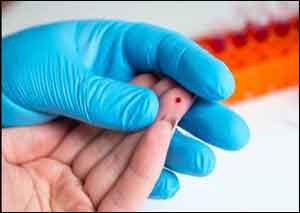- Home
- Editorial
- News
- Practice Guidelines
- Anesthesiology Guidelines
- Cancer Guidelines
- Cardiac Sciences Guidelines
- Critical Care Guidelines
- Dentistry Guidelines
- Dermatology Guidelines
- Diabetes and Endo Guidelines
- Diagnostics Guidelines
- ENT Guidelines
- Featured Practice Guidelines
- Gastroenterology Guidelines
- Geriatrics Guidelines
- Medicine Guidelines
- Nephrology Guidelines
- Neurosciences Guidelines
- Obs and Gynae Guidelines
- Ophthalmology Guidelines
- Orthopaedics Guidelines
- Paediatrics Guidelines
- Psychiatry Guidelines
- Pulmonology Guidelines
- Radiology Guidelines
- Surgery Guidelines
- Urology Guidelines
Finger prick test allows patients taking autoimmune drug to avoid blood draws

A new study shows that patients with rheumatoid arthritis and other autoimmune conditions who take the drug adalimumab can monitor drug levels in their bodies with a finger prick rather than undergoing a full blood draw.
Adalimumab standard dosing can result in insufficient clinical response or overtreatment in a large proportion of patients (1-4). Several circumstances can affect clinical efficacy, ranging from undetectable drug concentrations due to immunogenicity, to serum trough concentrations substantially above the threshold necessary for complete target blockade (1-8). Therefore, it seems logical to use a personalised dosing scheme based on drug concentration and disease activity.
This method offers the opportunity to simplify therapeutic drug monitoring of adalimumab.
"Easy home sampling at different time points will benefit patients and could help to prescribe biologics optimally," said Dr. Karien Bloem, senior author of the British Journal of Clinical Pharmacology study.
We show here for the first time that adalimumab and ADA serum concentrations can be satisfactorily estimated by measuring concentrations in DBS eluates, collected by finger prick. This method offers great opportunity to simplify TDM of adalimumab
Read the full article click on the following link : http://dx.doi.org/10.1111/bcp.13371
blood drawsBritish Journal of Clinical PharmacologyDr Karien Bloemfinger prickFinger prick testrheumatoid arthritistherapeutic drug monitoring
Next Story
NO DATA FOUND

Disclaimer: This site is primarily intended for healthcare professionals. Any content/information on this website does not replace the advice of medical and/or health professionals and should not be construed as medical/diagnostic advice/endorsement or prescription. Use of this site is subject to our terms of use, privacy policy, advertisement policy. © 2020 Minerva Medical Treatment Pvt Ltd